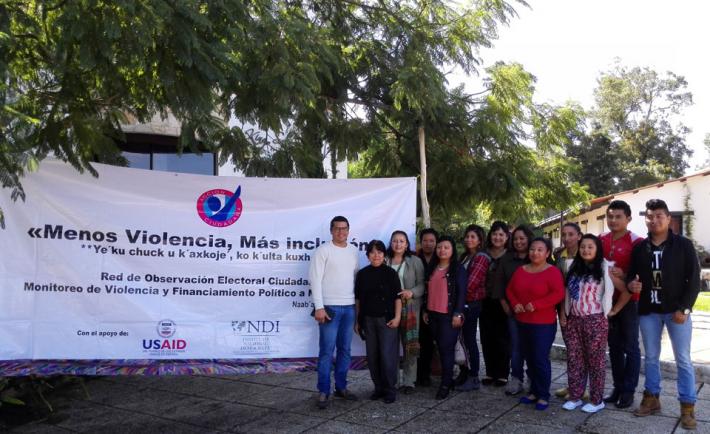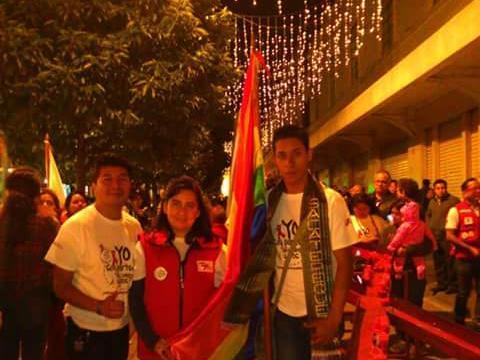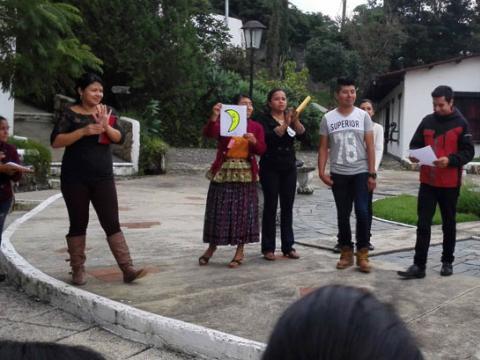Louis Enrique Borrayo Hernandez is a young Guatemalan man who learned about the election observation through Association Ixim, the local organization that supported Citizen Action’s (AC) observation in the department of Sacatepéquez, just outside of Guatemala’s capital.
We recently spoke with Louis, as well as his colleague Theylor (who preferred that we not use his full name), about why they decided to join the AC network as long-term observers. Their answer was clear: “we wanted to make a difference in our community and our country,” they both agreed.
For Louis and Theylor, who are gay men, political participation in Guatemala can be especially challenging. Guatemala has not passed sufficient legislation protecting lesbian, gay, bisexual, transgender and intersex (LGBTI) communities from violence and discrimination, including guaranteeing full access to public services. Although some government agencies are taking steps to reduce barriers to full civic participation, Louis and Theylor see the need to continue reducing discrimination as part of a larger process of giving a voice to all Guatemalans, regardless of sexual orientation or gender identity.
The observation efforts included a strong focus on improving social inclusion so Association Ixim made an effort to recruit observers that identified as LGBTI. Louis is the director of an LGBTI anti-discrimination organization called “Breaking the Silence” in the municipality of San Lucas, where he and his colleague conducted their observation.
Louis’s specific task was to monitor political party campaign spending in his community and others nearby. Like electoral violence monitors, campaign spending monitors completed weekly rounds of observation that helped AC project political party’ expenses by attending meetings and rallies, and interviewing community members.
“This observation was important because people felt listened to,” stated Louis. “People want to report what is happening in their communities, but in the past there haven’t been the channels to do so. This observation changed that.”
“We knew that parties didn’t respect campaign finance limits, but the observation helped us better understand how much they were spending past the limit.” - Louis Enrique Borrayo Hernandez
While Louis and his fellow observers in the AC network noted that it was hard to precisely track campaign spending because political parties are often hesitant to disclose financial information, they believe that the observation set an important precedent. This was the first time in many rural communities that the actions of political parties and candidates were being observed and reported. By the end of the observation, the parties knew that citizens were watching them and could hold them accountable for illegal spending. “We knew that parties didn’t respect campaign finance limits, but the observation helped us better understand how much they were spending past the limits,” affirmed Louis.
Nationally, the findings of electoral authorities confirmed Louis’s statements, showing that many -- though not all -- political parties had violated campaign spending limits and were sanctioned accordingly. Those sanctions should increase significantly once reforms to the Law on Elections and Political Parties recently passed by the Guatemalan Congress go into effect.
Louis and Theylor noted that this observation was an important first beyond conducting a long-term observation on electoral violence and campaign spending at the local level for the first time. For them personally, the most important first was including members of LGBTI communities in the observation project and talking about LGBTI rights with more than 1,300 people across the country.
When the project started, observers held introductory meetings with leaders in the communities where they would monitor campaign spending and electoral violence. In addition to discussing these two issues, which were the main focus of the observation, they also talked about social inclusion and the importance of combating discrimination and stigmatization based on sexual orientation and/or gender identity.
Given that Louis and Theylor personally face prejudice on a daily basis, they were gratified by the opportunity they were provided as observers to talk about and deepen people’s understanding of LGBTI rights. Promoting discussions of these issues in different communities is an important first step to breaking down stereotypes and ending discrimination.
Louis and Theylor understand that change takes time, but they hope that as citizens and politicians become more aware of sexual and gender diversity and that members of LGBTI communities have the same legal rights as any other citizen, that there will be more opportunities for them to participate in politics. Louis was told by one woman that if he hadn’t talked to them about inclusion issues, the community members still wouldn’t understand what it means to identify as lesbian, gay, bisexual, transgender or intersex. “Now they do, and that is the only way that things will ever change,” he concluded.





